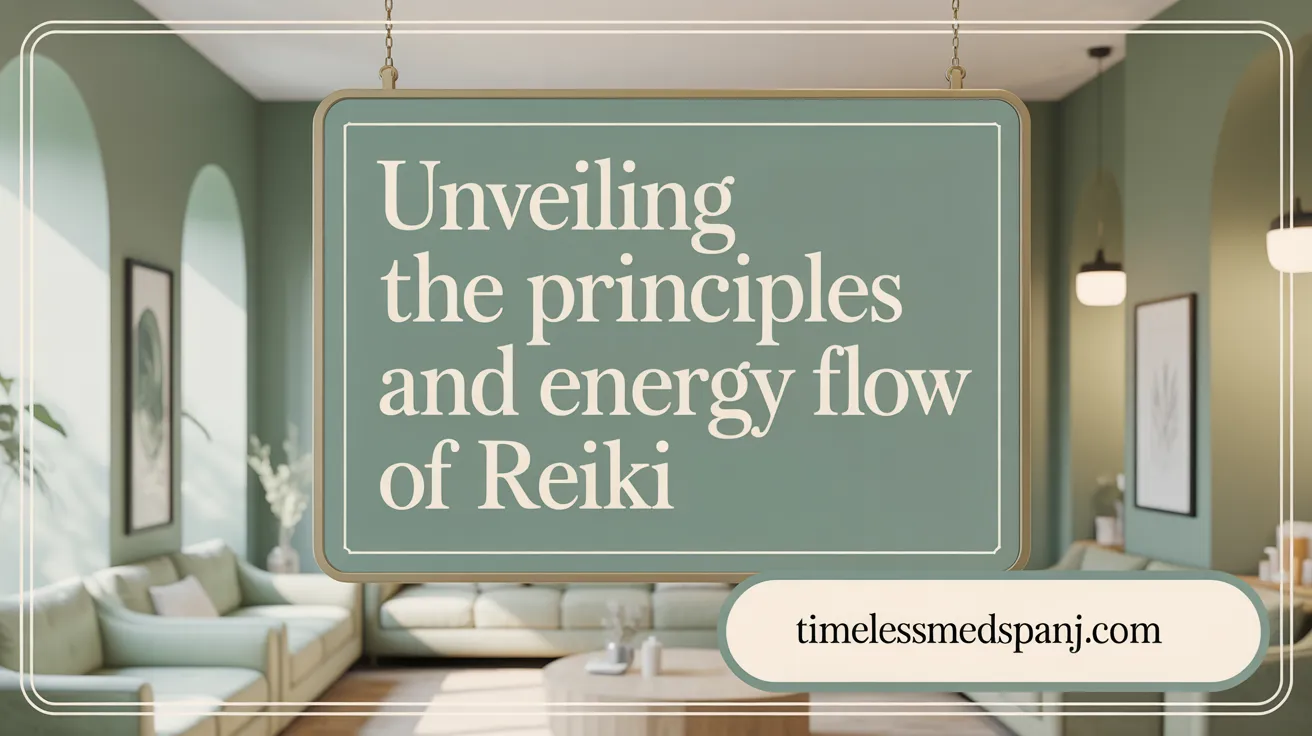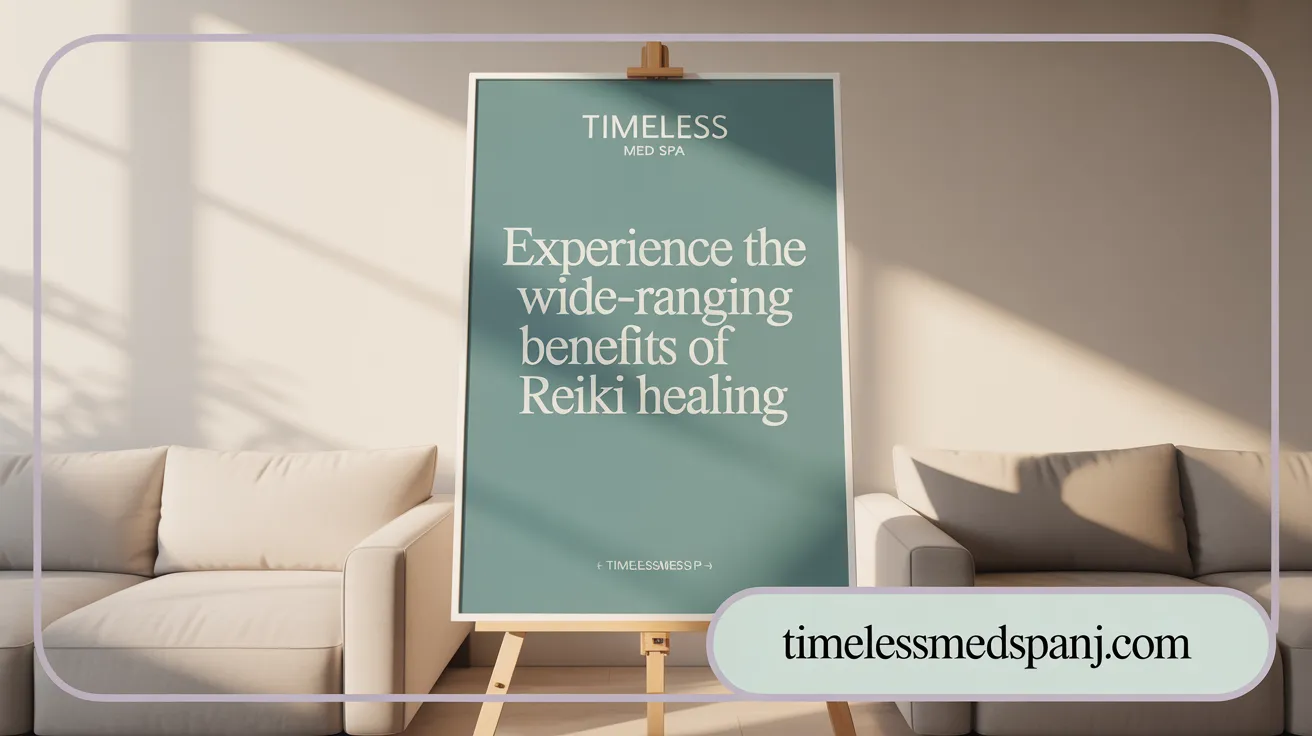Embracing Holistic Healing with Reiki
Reiki therapy, a holistic healing technique rooted in ancient Japanese tradition, offers a unique path to relaxation, emotional balance, and physical rejuvenation. As more individuals seek integrative approaches to wellness, Reiki's gentle practice of channeling universal life energy has gained global recognition as a complementary therapy. This article delves into the principles, benefits, and scientific perspectives of Reiki, guiding you on incorporating this energy healing into your daily self-care routine for enhanced well-being.
The Origins and Essence of Reiki Therapy

What are the origins and nature of Reiki as a complementary or integrative health modality?
Reiki is an energy-based healing practice that traces back to Japan in the early 20th century. It was founded by Mikao Usui in 1922 after what he described as a spiritual retreat on Mount Kurama. This technique involves channeling what practitioners call
Principles and Mechanisms Underpinning Reiki Healing

What are the principles and mechanisms of Reiki therapy as a holistic healing practice?
Reiki is a traditional Japanese energy healing technique that operates on the idea of a universal life force energy, often called 'ki' or 'chi'. Practitioners believe this energy flows through the body along pathways known as meridians and can become blocked or stagnate due to injury, emotional distress, or illness.
During a Reiki session, the practitioner gently places their hands on or just above specific areas of the client's body. The goal is to channel this universal energy to promote a balanced flow, remove energetic blockages, and support the body's innate healing capacity. Although there is no scientific validation for the existence of 'ki' or 'chi', many practitioners report experiencing sensations such as warmth, tingling, or pulsing, which they interpret as signs of energy flow.
Reiki encompasses several techniques including centering, clearing, beaming, extracting harmful energies, infusing, and smoothing the aura. These methods aim to harmonize the energy field around and within the body, fostering physical, emotional, and spiritual well-being.
Relaxation plays a central role in Reiki, as calming the nervous system activates the parasympathetic branch, which can help reduce stress, lower blood pressure, and improve sleep (source). Emotional well-being is also considered integral, with practitioners believing that releasing emotional blockages can lead to clearer thinking and better mental health (source).
Despite the lack of scientific evidence supporting the energy transfer, many people find Reiki a valuable complementary practice. The calming experience and subjective improvements in mood, pain, and stress are often attributed to the placebo effect and the relaxation response rather than direct energy manipulation (source).
Overall, Reiki remains a holistic therapy focused on restoring balance and harmony within the body, mind, and spirit. It is safe, non-invasive, and intended to complement, not replace, conventional medical treatments (source).
For more insights, searching "Principles and mechanisms of Reiki therapy" can provide further detailed discussions on its philosophical foundation and practical applications.
Health Benefits of Reiki Therapy: From Relaxation to Pain Relief

What health benefits does Reiki therapy offer, including relaxation, stress reduction, pain relief, emotional well-being, and mental health?
Reiki therapy provides a wide range of health benefits that support overall well-being. Several studies and reviews underscore its ability to promote deep relaxation, which is key to reducing stress and anxiety. When the body's parasympathetic nervous system is activated during a Reiki session, it triggers a calming response that can lower heart rate, blood pressure, and muscle tension.
Many recipients report feelings of warmth, tingling, or a profound sense of calm, which helps ease emotional tension. Supporting emotional health, Reiki assists in emotional healing by releasing energy blocks caused by unresolved feelings, stress, or trauma. This process can improve mood and help alleviate symptoms of depression and emotional distress.
Reiki also aids in managing pain and reducing fatigue, significant pain relief and improved quality of life after multiple sessions. For example, patients undergoing chemotherapy or coping with conditions like osteoarthritis often experience a decrease in physical discomfort and enhanced emotional resilience.
Sleep quality often improves with Reiki, especially among cancer patients, epilepsy, and multiple sclerosis sufferers, as sessions induce relaxation conducive to restful sleep. Physiological effects like lowered heart rate and blood pressure support this calming influence, contributing to overall mental and physical health.
Holistically, Reiki works to balance the body's energy fields, supporting mental clarity, emotional stability, and physical recovery. It is a safe, non-invasive practice, suitable for all ages and health statuses. When combined with other therapeutic approaches, Reiki can enhance mental health, promote emotional stability, aid in pain relief, and foster a sense of inner harmony and peace.
The Science Behind Reiki: Evidence and Mechanisms
What scientific research and evidence support the effectiveness and safety of Reiki therapy?
Scientific investigations into Reiki therapy suggest it may offer genuine benefits beyond placebo, especially in promoting relaxation and reducing stress. Multiple systematic reviews and clinical trials have reported that Reiki can activate the parasympathetic nervous system, which is responsible for calming the body. Physiological markers, such as decreased heart rate and blood pressure, along with increased heart rate variability, indicate a relaxation response (Reiki and parasympathetic nervous system, effects of Reiki on heart rate).
Research involving diverse patient groups—such as cancer patients, surgical patients, and individuals with chronic illnesses—shows that Reiki can alleviate pain, lessen fatigue, and improve overall quality of life. For example, a 2024 systematic review found that Reiki significantly reduced fatigue, pain, and stress, with no adverse side effects reported. Similarly, studies have observed reductions in anxiety and depression, supporting its role as a safe, complementary therapy (Reiki in cancer care, Reiki for anxiety and depression).
Physiological effects on nervous system
The beneficial effects of Reiki seem linked to its influence on the autonomic nervous system, particularly by stimulating the vagus nerve. This stimulation helps shift the body from a fight-or-flight response to a state of rest and digest, fostering relaxation and healing. Evidence also points to microvascular protection and regulation of automatic bodily functions, contributing to stress relief (Physiological effects of Reiki, Reiki and stress reduction).
Research on anxiety, depression, and pain
Reiki has been notably effective in managing mental health issues such as anxiety and depression. Systematic reviews highlight significant reductions in anxiety levels, often after just a few sessions (Therapeutic effects of Reiki on anxiety). For pain management, some studies report that Reiki lowers pain intensity and improves emotional well-being, especially in cancer and postoperative patients (Reiki and pain relief, Reiki for pain and fatigue).
Safety profile and lack of side effects
An essential aspect of Reiki’s appeal is its safety. Current scientific literature consistently reports no harmful side effects, making Reiki appropriate across age groups and health conditions. Its non-invasive nature means it can be used alongside conventional treatments without interference or risk (Safety of Reiki therapy, Reiki safety guidelines).
Limitations of scientific validation
Despite promising findings, the scientific study of Reiki faces limitations. Many existing studies are small, lack rigorous controls, or rely on subjective measures, which can introduce bias. High-quality randomized controlled trials are still needed to establish standardized protocols and confirm physiological mechanisms conclusively. The current evidence supports Reiki as a safe, supportive therapy, but more comprehensive research is essential to fully understand its effects and optimize its application (Limitations of Reiki studies, Need for further Reiki research).
Reiki’s Role in Enhancing Mental Health and Emotional Resilience

What are Reiki’s benefits specifically for mental health issues such as anxiety, depression, and emotional resilience?
Reiki is increasingly recognized for its positive impact on mental health, especially in reducing symptoms of anxiety, depression, and fostering emotional resilience. The therapy involves gentle hand placements or hovering hands over the body, aimed at balancing the flow of 'universal life force energy'—a concept that, while not scientifically proven, is believed to influence emotional and mental states.
Research and anecdotal reports indicate that Reiki promotes deep relaxation, which helps lower cortisol, the stress hormone often elevated in anxious or depressed individuals. By activating the parasympathetic nervous system, Reiki encourages a state of calmness and mental clarity, allowing emotional release and relief from mental tension.
The practice also assists in releasing emotional blockages—trapped feelings such as anger, sadness, or fear—that can contribute to depression or anxiety. Regular sessions create a safe, supportive environment that fosters self-awareness, emotional healing, and a sense of connectedness. This ongoing balance helps individuals become more resilient to stress and better equipped to handle life's challenges.
Furthermore, Reiki complements traditional mental health treatments by strengthening the mind-body connection. It encourages mindfulness, emotional stability, and inner peace, empowering individuals to engage more positively with their emotional well-being. The calming atmosphere, combined with the gentle approach, facilitates a regenerative process that can lead to improved mood, better sleep, and an overall enhanced sense of mental resilience. For more details on how Reiki improves mental health and emotional healing, see How Reiki can improve your mental health.
Promoting Relaxation, Emotional Balance, and Physical Healing Through Reiki
Reiki is a holistic energy-healing practice rooted in ancient Japanese traditions that aims to balance the body, mind, and spirit. One of the core ways Reiki promotes well-being is by activating the parasympathetic nervous system, the branch of the autonomic nervous system responsible for 'rest and digest' functions. This activation helps reduce stress hormones such as cortisol, leading to a state of deep relaxation and calmness.
During a Reiki session, gentle hand placements or hovering hands are used over specific energy centers or chakras. Many recipients report sensations like warmth, tingling, or pulsing, which are often considered signs of energy flow. These sensations can enhance a person's sense of peace and personal well-being.
Reiki also helps release accumulated stress and emotional tension. By alleviating emotional trauma and unresolved feelings, it fosters emotional balance and stability. This process supports mental clarity and reduces feelings of anxiety, depression, or emotional exhaustion.
Furthermore, Reiki supports the body's natural healing processes. The gentle energy transfer can improve blood circulation, lower inflammation, and stimulate cellular repair. This makes Reiki beneficial for physical recovery, especially after injury or illness, as it encourages the body’s self-healing mechanisms.
On a broader level, Reiki works to harmonize the physical, emotional, and spiritual facets of health. It aims to remove energy blockages that may cause discomfort or disharmony, promoting a sense of inner peace and vitality. Overall, Reiki's non-invasive approach helps individuals reach a balanced state conducive to healing and well-being, making it a valuable complement to conventional medical treatments.
Incorporating Reiki into Wellness Routines and Self-Care
Self-Reiki practice and techniques can be a valuable part of daily self-care routines, helping to promote physical, emotional, and energetic balance. Many people learn simple hand positions and breathing techniques through beginner courses, which enable them to perform self-Reiki regularly. These practices often involve placing hands lightly on or just above key energy centers, known as chakras, to facilitate relaxation and energy flow (Reiki hand placements, Practicing self-Reiki for energy balance).
Complementary holistic therapies, such as yoga, meditation, and acupuncture, integrate well with Reiki, creating a comprehensive approach to well-being. Combining these practices can amplify the calming and restorative effects, helping to reduce stress, improve sleep, and boost overall vitality (Holistic therapies: acupuncture, yoga, and meditation, Reiki for stress relief and sleep improvement).
Creating personalized wellness plans involves assessing individual needs, lifestyle, and health goals. Incorporating Reiki can be as simple as scheduling weekly or daily self-treatment sessions, adjusting frequency based on how one feels and their ongoing health concerns. Professional Reiki training provides deeper understanding and techniques, empowering individuals to incorporate energy healing into their regular self-care routines (Creating personalized wellness plans, Learning Reiki levels).
Using Reiki for stress relief and energy balance is particularly effective when practiced consistently. Brief sessions—around 10 to 15 minutes—can be performed during breaks at work or in the evening to unwind. Many find that maintaining a regular practice enhances emotional stability, reduces physical discomfort, and fosters a sense of inner harmony (Reiki relaxation effects, Reiki and mood improvement).
To experience sustained benefits, consistency is essential. Regular practice helps reinforce energetic stability, improves resilience to daily stresses, and supports long-term wellness. Keeping a journal of feelings and physical sensations can help track progress and adjust techniques accordingly (Benefits of multiple Reiki sessions, Reiki and emotional healing).
In sum, integrating Reiki into everyday life involves practicing self-Reiki, aligning it with other holistic practices, and creating a tailored wellness plan reinforced through regular sessions. This holistic approach enables individuals to nurture their mind, body, and spirit efficiently and effectively (What is Reiki, Combining massage and Reiki sessions).
Practical Methods for Daily Integration of Reiki
Integrating Reiki into your everyday routine can be simple and profoundly beneficial for both emotional and physical well-being. Start by learning basic self-Reiki techniques, which involve placing your hands on or near key energy points on your body, such as the heart, abdomen, and head. These simple practices can be done daily, helping to promote relaxation, balance, and energy flow.
In addition to hands-on techniques, incorporate the principles of mindfulness and intention setting into your daily activities. Before meals, during breaks, or while walking, take a moment to focus on your breath, set a healing intention, or express gratitude. This conscious awareness aligns with Reiki’s holistic approach, fostering mental clarity and emotional resilience.
Creating routines like morning meditation, evening reflection, or dedicated self-Reiki sessions can reinforce your practice. For instance, starting your day with a few minutes of intention setting or ending it with gratitude can help cultivate a peaceful mindset.
Engaging with nature amplifies the healing benefits. Spending time outdoors, grounding yourself by walking barefoot or simply appreciating natural surroundings, enhances your energy balance and emotional health.
Acts of kindness and compassion also reinforce Reiki’s core values of universal love and healing. Helping others, volunteering, or even small acts of everyday kindness can deepen your sense of connection and spiritual growth.
By establishing these habits consistently, you create a supportive environment for ongoing healing. Incorporating simple self-Reiki practices, mindfulness, nature, and kindness into daily life can strengthen your resilience, promote emotional stability, and maintain physical vitality with minimal effort.
Reiki’s Support for Recovery and Enhanced Quality of Life
How does Reiki support recovery, improve quality of life, and enhance overall wellness?
Reiki aids in recovery and boosts quality of life by fostering a state of deep relaxation, which helps lower stress and anxiety levels that can impede healing. During a typical session, the gentle placement of hands or hovering techniques channel universal life force energy, promoting a balanced flow that supports the body's natural healing processes.
Physiological benefits aiding healing
Research shows that Reiki activates the parasympathetic nervous system—the body’s rest-and-digest response. This activation results in lower heart rate, reduced blood pressure, and decreased stress hormones, creating an environment conducive to healing. Some studies note physiological effects such as increased heart rate variability and improved blood circulation, which contribute to faster recovery and stronger immune responses. For more information, see Reiki effects on heart rate and blood pressure.
Emotional and mental support for recovery
Reiki promotes emotional stability by alleviating feelings of fear, depression, and emotional blocks that often accompany illness or recovery from procedures. Patients frequently report feelings of warmth, calmness, and emotional release that enhance mental resilience. In individuals facing chronic conditions or post-surgical recovery, these emotional benefits can translate into improved coping skills and a more positive outlook. These benefits are further discussed in How Reiki improves mental health.
Improvement in quality of life indicators
Evidence highlights that regular Reiki sessions lead to noticeable improvements in overall well-being, including better sleep, less fatigue, and reduced physical discomfort. A comprehensive systematic review in 2025 demonstrated that Reiki significantly enhances quality of life, especially when administered in multiple sessions of at least 60 minutes. Patients with cancer, post-operative needs, or chronic illnesses often experience a greater sense of balance and vitality.
Use alongside conventional medical treatments
As a non-invasive, safe therapy, Reiki is frequently integrated into conventional healthcare settings. It complements medical treatments by reducing treatment-related side effects like nausea, fatigue, and emotional distress. Although not a substitute for evidence-based medicine, Reiki offers holistic support by addressing emotional, mental, and spiritual aspects of recovery. Learn more at Reiki in medical centers and Reiki as complementary therapy.
Reiki’s holistic approach makes it a valuable addition to recovery protocols, helping patients regain strength faster and foster overall wellness. Its calming influence benefits individuals of all ages and health statuses, reinforcing its role as an accessible, complementary healing method. For additional insights, see The Science Behind Reiki and Benefits of Reiki Healing.
Safety Considerations and Common Misconceptions About Reiki
Reiki is widely regarded as a safe and non-invasive therapy, with no known adverse effects reported in scientific studies or clinical practice. Since the practice involves gentle hand placements or hovering hands that do not involve ingestion, bodily manipulation, or electrical interventions, it is suitable for most individuals, including children, pregnant women, and those with chronic illnesses. Its safety profile makes it a popular complementary approach alongside conventional medical treatments.
It is crucial, however, to seek out practitioners who are properly trained and hold verified credentials. Although restrictions vary by region, many reputable organizations such as the UK Reiki Federation and the Federation of Holistic Therapists provide certification and registration for qualified practitioners. Working with licensed and experienced professionals helps ensure a safe and beneficial experience.
Reiki is intended to be a supportive, adjunct therapy rather than an alternative or substitute for evidence-based medical care. It is important not to rely solely on Reiki for serious health conditions or urgent medical needs. Instead, use it as part of a holistic health plan recommended by healthcare providers.
A common misconception is that Reiki is inherently a spiritual or religious practice. While some individuals integrate spiritual beliefs into their experience, Reiki itself does not require any religious affiliation and is practiced in secular settings. The focus remains on promoting relaxation, stress reduction, and emotional well-being through the flow of energy.
During treatments, clients often experience sensations like warmth, tingling, or emotional releases, which are normal and can be signs of energy flow or emotional processing. These feelings typically pass shortly after the session ends.
In conclusion, Reiki's safety record is strong when conducted by qualified practitioners, and it should be viewed as a gentle, supportive therapy that enhances overall wellness. The primary precautions involve verifying practitioner credentials and maintaining open communication with healthcare providers, particularly when managing serious illness or medical devices.
Enhancing Wellness: Combining Reiki With Other Therapies
Synergistic effects with massage and acupuncture
Integrating Reiki with massage therapy or acupuncture can amplify the benefits of each modality. Combined, these therapies promote deeper relaxation, improve energy flow, and support overall well-being. For example, scheduling Reiki sessions immediately after massage can help reinforce relaxation, while acupuncture can be complemented by Reiki's emphasis on balancing energy. Both techniques work toward reducing stress and relieving physical discomfort, often resulting in enhanced mental clarity and emotional stability.
Creating personalized, holistic wellness plans
Personalized wellness plans are essential for maximizing health benefits. Incorporating Reiki alongside other practices like yoga or meditation tailors the approach to individual needs. By assessing personal health goals, practitioners can suggest the appropriate frequency and combination of therapies. Regular Reiki sessions, combined with mindful practices, can foster a sustained sense of balance and inner harmony.
Benefits of combining Reiki with yoga and meditation
Reiki enhances yoga and meditation by deepening relaxation, reducing mental clutter, and facilitating emotional release. When practiced together, these modalities can help cultivate mindfulness, improve sleep quality, and strengthen resilience against stress. Engaging in Reiki before meditation or yoga can set a grounded and calm mindset, allowing participants to experience the full benefits of their practice.
Timing and sequencing of therapies
Optimal results often depend on the timing and sequence of treatments. For instance, scheduling Reiki sessions before bedtime can improve sleep, whereas a session after physical activity can promote quicker recovery. Combining therapies on the same day with appropriate intervals allows the body and mind to process and integrate the effects effectively. Consulting with holistic health professionals helps in planning a sequence that respects individual needs.
Consultation with health professionals for integration
Before integrating Reiki with other therapies, it is advisable to consult healthcare providers. They can help ensure that the combination aligns with medical treatments and does not interfere with essential therapies. Qualified practitioners can assist in designing a balanced, safe, and effective wellness plan, enhancing the overall healing process. This collaborative approach supports safe, comprehensive care tailored to each person's unique health profile.
Inviting Reiki Into Your Wellness Lifestyle
Reiki therapy offers a gentle yet profound approach to enhancing relaxation, emotional resilience, and physical healing within a holistic wellness framework. Rooted in ancient tradition yet embraced by modern complementary medicine, Reiki serves as a valuable tool to harmonize body, mind, and spirit. Supported by growing scientific evidence underscoring its safety and mental health benefits, Reiki can be readily integrated into daily self-care and wellness routines. Whether through professional sessions or self-practice, Reiki promotes balance and rejuvenation, empowering individuals to nurture their well-being naturally and compassionately. Embracing Reiki as part of a comprehensive health strategy invites a path toward greater calm, vitality, and holistic harmony.
